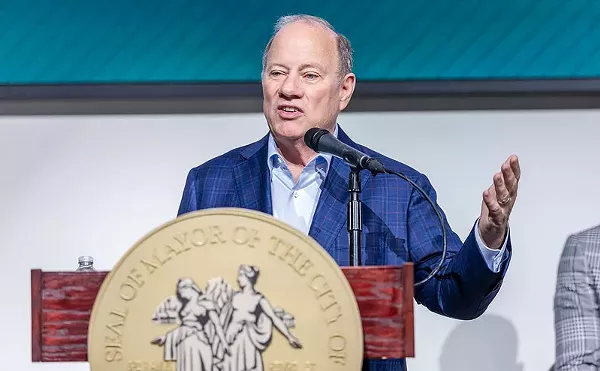
Audio By Carbonatix
[
{
"name": "GPT - Leaderboard - Inline - Content",
"component": "35519556",
"insertPoint": "5th",
"startingPoint": "3",
"requiredCountToDisplay": "3",
"maxInsertions": 100,
"adList": [
{
"adPreset": "LeaderboardInline"
}
]
}
]
Well, let’s see: Our nation is tied down in a quagmire of a war it was lied into and has no idea how to get out of. Meanwhile, we’re running budget and trade deficits that are invisibly undermining our economy. The state of Michigan is stuck in a perpetual budget crisis that’s threatening our great universities, thanks to the crackbrained ideology of the Republicans who control the Legislature, and the political weakness and timidity of the Democratic governor.
Locally, we have an impoverished core city led by an immature and self-indulgent mayor, surrounded by smug, better-off suburbs filled with shortsighted and selfish leaders who think that Detroit’s troubles are none of their concern.
Throw in pollution, violence, bankrupt public schools, a cowardly or corrupt media, and the occasional story of a valiant person doing their best to swim against the tide, and that’s enough material for a lifetime or so.
But what is the basis for the opinions that I give in this space? That’s a legitimate question that readers probably should ask any columnist, and which I have decided to try to answer.
I’ve been doing this column for a dozen years now. Every so often I’m introduced as “the liberal columnist Jack Lessenberry,” no doubt because of the jealousy that would arise if I were introduced as an international sex god. What both amuses and appalls me is that once I’m defined as a liberal, people launch into attacking me for opinions they assume I must have.
Why, I get asked rhetorically, do I A) hate America, B) love Hillary Clinton, C) support quotas for blacks on the job and in university admissions, D) think gays should have more rights than anyone else, etc., etc. Naturally, I am always tempted to answer that the devil makes me, and start making gurgling sounds and reciting the Lord’s Prayer backward.
However, I am gaining a little bit of maturity. So it’s time to reveal my true ideology, which isn’t based on the teachings of any religion, the imagined historical inevitability of the dialectic, or even the I Ching.
What I call it is fundamental common sense. Essentially, my philosophy is properly more conservative — in the true meaning of that word — than liberal. What I believe is that ours is the best system of government ever devised, and that we ought to honor most of our culture’s time-honored institutions.
For starters, I think the genius of our system is that it provides for broad, sweeping freedoms that end, as they used to say, where the other guy’s nose begins. That’s why the Constitution of the United States is the most important document ever written, and that’s why freedom of religion — and the necessity of keeping government out of religion — is so important.
What I essentially believe is that we ought to be as free as possible to determine our own destiny, and we should respect everyone else’s right to do the same. However, we are not alone in our boardrooms or on this planet. Therefore we need a social safety net, and military defenses and government support for some institutions that make life better for us all.
That’s why we need government to safeguard the purity of the air and water and food supplies, and to help nurture public education. That’s why we need government to help guarantee some minimal income for those who are very old or disabled — Social Security — and why we should also guarantee a minimum standard of medical care. That isn’t socialism. That’s common sense.
Everyone should be encouraged to do better on their own; to get rich if they can, to take risks if they dare. Several weeks ago I saw, on a news channel, politicians advocating weakening Social Security in favor of allowing people to make their own decisions about investing their money in the marketplace, etc.
This was followed with a report on young mothers who were so addicted to crystal meth that they neglected their babies. Yes, they can certainly be trusted to make sensible financial decisions for their retirement. Five years ago, the same politicians would have been advising them to invest in Enron.
What common sense also indicates is that building a nest on a smoking time bomb isn’t very sensible. Detroit is clearly in bad shape financially and otherwise; the city schools are, by most measures, even worse. But why do so many suburbanites think they don’t need to worry about a huge ghetto of poor, sullen and resentful people a few miles away?
The ideology of this column is purely American, as in: We ought to try to fix our own problems, so that all of us have better and more fulfilling lives. We ought to take responsibility for our actions, individually and as a nation.
What does that mean as a call for action? Sadly, there isn’t any big book of canon law, or little red book of quotations, when it comes to guiding those whose fundamental political ideology is based on common sense.
Even reasonable people who are otherwise like-minded won’t always agree on what common sense might be in any particular situation. That’s inevitable. The point is to appeal to reason and, as George Orwell, one of the sanest journalists of all time, said, to avoid getting stuck in some perverse mood.
That, fundamentally, is what this column stands for.
Here’s some of what I think that means in the real world:
Internationally: Mankind’s hope has to be based on the simple idea that led to the founding of the United Nations. That is, that no country has the right to attack and, especially, the right to conquer and occupy any other, except as a matter of national survival. That’s why the war in Iraq is so outrageous, immoral and wrong, no matter how bad Saddam Hussein was.
That doesn’t mean we shouldn’t be involved in the world. Nobody expects the United States to give up its standard of living to bring Togo up to snuff. But it doesn’t take a Nobel Peace Prize winner to understand that even if you don’t think we have a duty to help the other 96 percent of the world, doing so would be prudent. What goes around comes around. Ask Marie Antoinette.
State Politics: Robert Heinlein coined the acronym TANSTAFL, for “There Ain’t No Such Thing As A Free Lunch.” The unpleasant truth is that for Michigan to be a desirable place to live, with decent roads and the schools we need to be competitive, the state needs more revenue. That means we need to pay more taxes. Democrats don’t have the guts to admit it; Republicans think all taxes are bad. Perhaps they’d prefer the late Pleistocene era, when there were no taxes, or governments, and the average human life span was probably about 16 years or so.
Locally: Detroit cannot support itself. That’s because the money and the capital left the city’s borders, leaving behind those who couldn’t leave. What’s needed is some form of metropolitan government, as soon as possible.
That’s an outline of where we are. What we need to do, in short, is admit that we’re all in this metropolis and this nation and this world together.
And the minute that happens, I’ll stop writing this column for good
Do You Feel A Draft Coming? No, not from your badly caulked window, but from Washington. Mandy Carter, a longtime peace organizer, will speak on war and conscientious objection at 2 p.m. Sunday, Feb. 27, in the First Unitarian-Universalist Church at Cass and Forest avenues, near Wayne State. Right now a draft may not seem likely, but with Paul Wolfowitz and Donnie Rumsfeld, you never know.
Jack Lessenberry opines weekly for Metro Times. Send comments to letters@metrotimes.com




